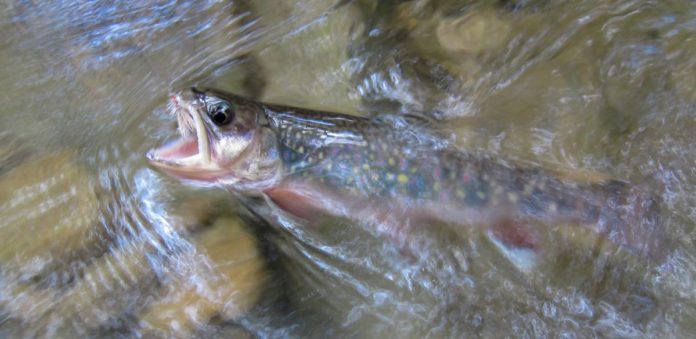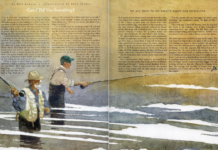A saying among anglers is that trout don’t live in ugly places. It’s a nice reminder of what we love about West Virginia and the cold, clear, clean, fishable waters of our mountain home.
West Virginia has but one native trout species, the brook trout (Salvelinus fontinalis) which is designated as the state’s official fish. These trout, sporting beautiful dark green flanks spotted with yellow and red, can be seen feeding on insects and small fish in the clear waters of wilder parts of the eastern third of the mountain state. Fly fishermen will tell you that the brook trout is cunning and wary, and that bringing one of these beautiful fish to hand with a fly rod is a true delight. For me and many of my fly fishing friends, the joy of catching a brook trout is topped off by releasing it, unharmed, back to the wild.
But make no mistake, native brook trout populations are fragile. A continuous stream flow of cold, clear, highly-oxygenated water is critical to the survival and health of these fish. Sedimentation of streams resulting from construction activities, such as road building and pipeline crossings, presents a major threat to native fish populations. Unchecked sedimentation of brook trout streams can harm fish by clogging gills, smothering spawning beds, suffocating eggs and choking off insect life on which fish feed.
Many brook trout streams lie in the path of the Mountain Valley Pipeline (MVP) route. The West Virginia State Council of Trout Unlimited is concerned that our native brook trout populations are made more vulnerable as a result of the construction of the MVP. Brook trout live and spawn in the small, cold headwaters and tributaries of the Elk, Greenbrier and Gauley rivers, all of which will be crossed many times by the MVP.
Each stream crossings represents a very real threat to native trout populations in those streams. Digging trenches across or boring tunnels underneath the trout streams crossed by the MVP increases the risk of sedimentation events that can damage brook trout populations in those waters.
The West Virginia Department of Environmental Protection has cited MVP pipeline constructors hundreds of times for releasing sediment into water bodies in violation of water pollution rules resulting in over $2 million in fines. A large numbers of MVP’s planned water-crossings have yet to be completed. MVP’s record of fines and violations on its work to date reflects an inability to safely protect our streams. This should be a serious red flag for a pipeline which has so many crossings on sensitive brook trout streams ahead of it.
The DEP must continue to focus on improved performance of MVP construction activities. MVP’s history of violations calls for more critical analysis of MVP permits and lower thresholds for denying or revoking them. MVP’s poor performance history would justify enhanced erosion control measures, increasing oversight of MVP’s construction and operations, and levying penalties and fines for failure to protect our waters. The Legislature must ensure that the DEP has adequate funding and resources to fulfill its responsibility to protect the waters of the Mountain State.
Several energy-based mega corporations have recently and publicly shifted emphasis away from a decades-long focus on fossil fuels and towards renewable energy sources. The mounting challenge of climate change resulting from the use of fossil fuels, calls to question the wisdom of pursuing increasingly archaic, environmentally injurious endeavors such as the MVP.
As we await more enlightened thinking and action on these matters, we cannot hesitate today to protect our precious waters, and the fishy, native denizens that inhabit them.
Protecting the quality of our essential and abundant mountain waters requires vigilance and voice from many individuals and organizations. The stakes are high, and every citizen has a lot to lose if the water quality of the state’s rivers and streams is allowed to deteriorate. This is one of the top concerns for the West Virginia Council of Trout Unlimited, and we count ourselves fortunate to have organizations such as the West Virginia Rivers Coalition, the West Virginia Highlands Conservancy, the West Virginia Environmental Council and others who share our concerns and advocate for the protection of West Virginia’s streams and rivers.
If you are concerned about MVP’s impacts on trout streams, submit comments to WQScomments@wv.gov by June 22.
Randy Kesling is conservation chairman for the West Virginia state council of Trout Unlimited.
Credit: Source link































